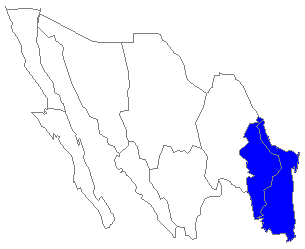 |
 

 |


Tiger Mimic-Queen (Lycorea cleobaea [Godart])
Wing span: 3 3/4 - 4 1/4 inches (9.5 - 10.8 cm).
Identification: Large. Orange with black horizontal stripes; stripes on hindwing join to form a loop. Tip of male abdomen has black hair pencils (scent brushes).
Life history: Males perch in the morning to await receptive females. Around noon, females lay eggs singly on the underside of host leaves, usually depositing several eggs on the same plant. Caterpillars eat leaves.
Flight: April, July, and October in South Texas; all year in the tropics.
Caterpillar hosts: Papaya, fig, bloodflower, Jacartia.
Adult food: Bird droppings.
Habitat: Tropical forests.
Range: Tropical American lowlands from the West Indies and central Mexico south to Peru. Strays to South Texas.
Conservation: Not required for rare stray.
The Nature Conservancy Global Rank: G5 - Demonstrably secure globally, though it may be quite rare in parts of its range, especially at the periphery.
Management needs: None reported.
References:
DeVries, P. J. 1987. The butterflies of Costa Rica and their natural history.
Papilionidae, Pieridae, Nymphalidae. Princeton University Press, Princeton,
New Jersey. 327 pages, 50 color plates.
Opler, P. A. and V. Malikul. 1992. A field guide to eastern butterflies. Peterson
field guide #4. Houghton-Mifflin Co., Boston. 396 pages, 48 color plates.
Scott, J. A. 1986. The butterflies of North America. Stanford University Press,
Stanford, Calif. 583 pages, 64 color plates.
Author: Jane M. Struttmann
State and Regional References:
Opler, Paul A. 1999. Peterson Field Guide to Western Butterflies, revised
edition. Houghton Mifflin Co., Boston, Mass.
Stanford, R.E. and P.A. Opler. 1993. Atlas of Western USA Butterflies.
Privately published, Denver, Colo.

